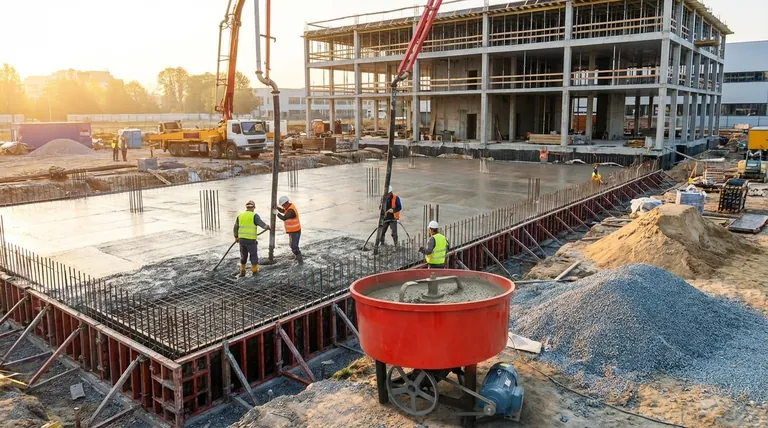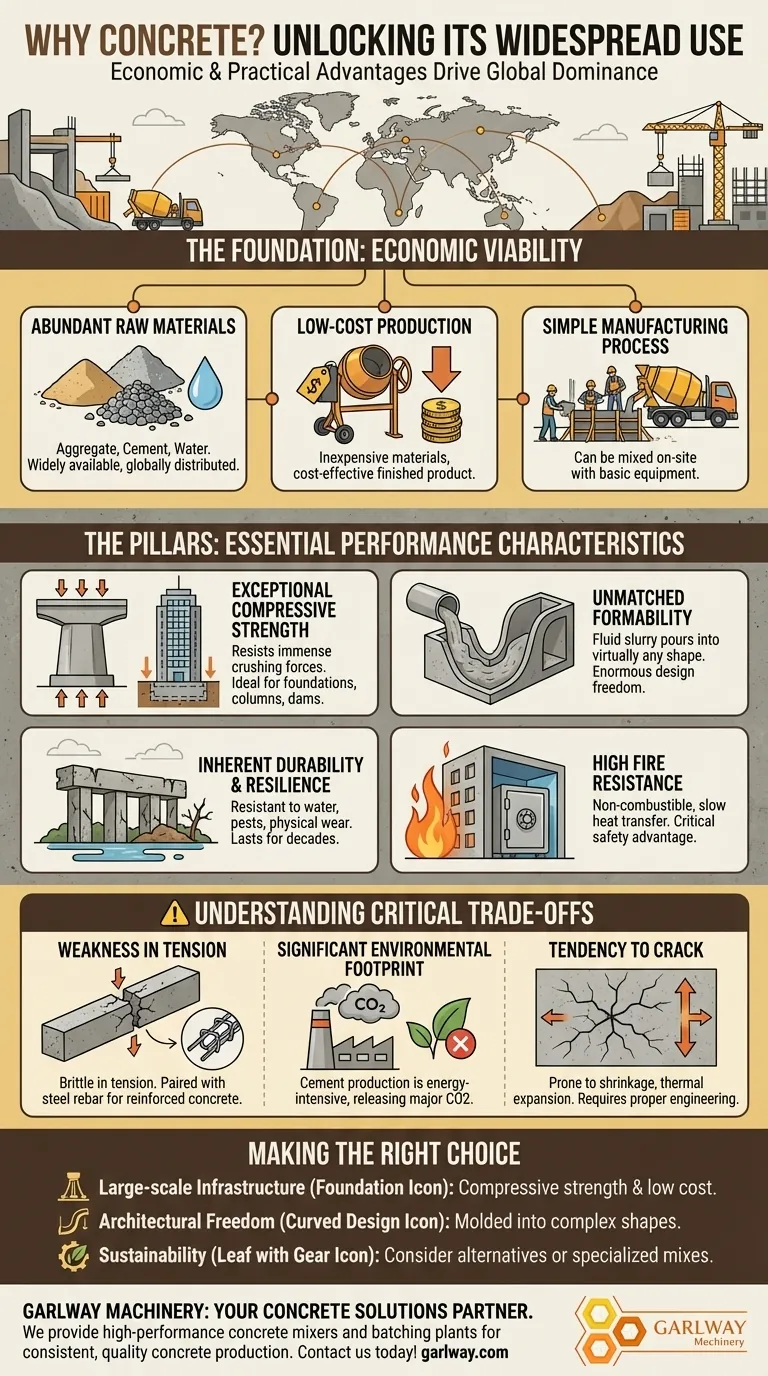The widespread use of concrete stems from a powerful combination of economic and practical advantages. At its core, it is a globally available, low-cost material that is simple to produce, making it accessible for projects of any scale, from a small patio to a massive skyscraper.
Concrete's dominance isn't due to a single superior feature, but its unique ability to deliver high performance and durability at an exceptionally low cost, using raw materials found almost anywhere on Earth.

The Foundation: Economic Viability
The primary drivers behind concrete's adoption are economic. It presents a low barrier to entry for construction projects worldwide.
Abundant Raw Materials
Concrete is made from three main components: aggregate (sand, gravel, crushed stone), cement, and water. These materials are among the most abundant and widely distributed resources on the planet.
This global availability means that concrete can be produced locally, drastically reducing transportation costs and logistical complexity compared to materials like steel or specialized timber.
Low-Cost Production
The raw materials for concrete are inexpensive to extract and process. This fundamental cost-effectiveness is passed down through the entire supply chain.
The result is a finished product that offers incredible strength and durability for its price, making it the most cost-effective choice for the vast majority of structural applications.
Simple Manufacturing Process
While high-tech concrete plants exist, basic concrete can be mixed on-site with relatively simple equipment. This simplicity allows for its use in remote or less-developed areas where access to complex machinery is limited.
The Pillars: Essential Performance Characteristics
Beyond its low cost, concrete provides a set of physical properties that make it ideal for construction.
Exceptional Compressive Strength
Concrete's defining mechanical property is its ability to resist immense crushing forces. This makes it the perfect material for foundations, columns, dams, and any structural element designed to bear heavy loads.
Unmatched Formability
When first mixed, concrete is a fluid slurry that can be poured into molds of virtually any shape. This versatility gives architects and engineers enormous design freedom, allowing for complex curves and massive forms that would be impractical with other materials.
Inherent Durability and Resilience
Once cured, concrete is highly resistant to water, rot, pests, and physical wear. This longevity ensures that structures built from it can last for decades or even centuries with minimal maintenance.
High Fire Resistance
Concrete is non-combustible and has a slow rate of heat transfer. This inherent fire resistance provides a critical safety advantage, protecting structural integrity during a fire and giving occupants more time to evacuate.
Understanding the Critical Trade-offs
No material is perfect. To use concrete effectively, it is crucial to understand its limitations.
Weakness in Tension
While strong under compression, concrete is brittle and performs poorly when pulled apart (tensile strength). This is why it is almost always paired with steel reinforcement (rebar), which has excellent tensile strength, creating the composite material known as reinforced concrete.
Significant Environmental Footprint
The production of Portland cement, the key binder in concrete, is an energy-intensive process that releases enormous amounts of carbon dioxide (CO2). The concrete industry is a major contributor to global greenhouse gas emissions.
Tendency to Crack
Concrete can be prone to cracking due to factors like shrinkage as it dries, thermal expansion and contraction, and applied loads. Proper engineering and joint placement are essential to manage and control this behavior.
Making the Right Choice for Your Application
Selecting a material requires balancing its properties with the project's goals.
- If your primary focus is large-scale infrastructure: Concrete's compressive strength, durability, and low cost make it the default choice for foundations, dams, and bridges.
- If your primary focus is architectural freedom: Its ability to be molded into nearly any shape allows for creative designs that are difficult to achieve with other materials.
- If your primary focus is sustainability: You must consider alternatives or specify specialized concrete mixes that use supplementary materials to reduce the overall carbon footprint.
Ultimately, understanding both its profound strengths and inherent limitations is the key to leveraging concrete effectively.
Summary Table:
| Characteristic | Key Benefit |
|---|---|
| Economic Viability | Low-cost, abundant materials, simple production |
| Compressive Strength | Ideal for foundations, columns, and heavy loads |
| Formability | Can be molded into complex shapes and designs |
| Durability & Resilience | Resistant to water, rot, pests, and fire |
| Fire Resistance | Non-combustible, provides critical safety |
Ready to leverage concrete's strengths for your next project? As GARLWAY, a specialist in construction machinery, we provide high-performance concrete mixers and batching plants that help construction companies and contractors produce consistent, high-quality concrete efficiently. Let us support your project's success—contact us today to discuss your needs!
Visual Guide

Related Products
- Commercial Construction Mixer Machine for Soil Cement Mixing Concrete
- HZS75 Concrete Batching Plant Cement Mixer Price Concrete Mixer Bunnings Mixing Plant
- HZS180 Ready Mix Concrete Plant for Foundations with Sand and Cement
- Hydraulic Concrete Mixer Machine Cement Mixing Equipment for Mixture Concrete
- HZS25 Best Cement Mixer for Quick Mix Concrete at Bunnings
People Also Ask
- What is the purpose of a concrete pump on a construction site? Achieve Faster, Safer, and More Precise Concrete Placement
- How should a boat be secured after winching onto the trailer? A Step-by-Step Guide to Safe Transport
- How do mineral admixtures affect the strength of concrete? Optimize Mix Design for Superior Performance
- Why is proper winch installation important? Ensure Safety and Reliability for Your Vehicle
- How often should a hoist be serviced and inspected? A Guide to Safe & Compliant Maintenance
- What are deep profile winches best suited for? Unmatched Power for Heavy-Duty Industrial Lifting
- How does the boat launch ramp condition affect winch selection? Ensure Safe Retrieval on Any Ramp
- What are some common applications of winches? Essential Uses in Construction, Recovery & More


















